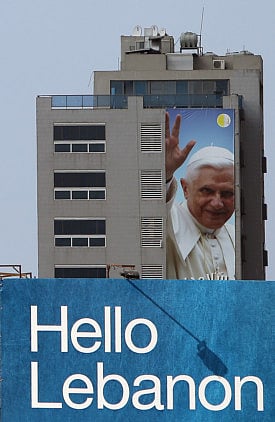Beirut: Pope Benedict XVI visits Lebanon on Friday where he is expected to address threats to religious pluralism in key countries like Lebanon, Syria and Egypt, and the welfare of 13 million or more embattled Catholics and other Christians in several Arab countries as well as the Occupied Palestinian Territories.
Naturally, it was a given that he would also call for an end to the civil war in Syria, though it remained to be determined whether he would ask the faithful to work for peace and democracy alongside their moderate Muslim brothers, rejecting fanaticism.
The Pope’s other preoccupation will probably be the exodus of Christians from the entire region, a topic that Middle East bishops have presumably digested since their 2010 gathering, and whose conclusions will be made public during this visit. While the civil war in Syria will undoubtedly cast a long shadow over Benedict XVI’s trip to Lebanon, every political and religious group apparently pledged not to disrupt the visit.
President Michel Sulaiman, Speaker Nabih Berri and Prime Minister Najeeb Mikati managed to secure full cooperation to ensure that no security breaches occur.
A few days ago, the Maronite patriarch received representatives from Hezbollah who, apparently, “expressed their joy at the pope’s visit.”
To be sure, the Pope was expected to spend most of his time with officials, not the faithful, which was necessary because of potential security concerns.
Still, the word is out that the visit will be a success, and that no “private military wings” of leading “families” will be allowed to roam the streets wearing masks and carrying machine guns. Benedict XVI will follow the immensely charismatic John Paul II who visited Lebanon in 1997 and who extolled the country’s multi-confessional society as a genuine model for the entire region.
Yet, because so much changed in the area since then, including political tsunamis after 2010, many wondered whether the Pontiff would note that most Arabs no longer wished to live under oppression.
On the contrary, they yearned for justice and freedom, which was why everyone hoped that the Pontiff would speak boldly on Syria, especially if he were to utter such a pronouncement from relatively free Lebanon. With the exception of the 2001 League of Arab States Summit held under unprecedented security measures, the Lebanese have never experienced the type of precautions that will envelop the visit of the Pontiff.
An estimated 20,000 military personnel, drawn from the Lebanese Armed Forces (60,000 plus) and the Internal Security Forces (30,000 plus) will provide both brawn and brain to ensure the Pontiff’s safety during the three days he is scheduled to spend in the country.
They will be supported by an estimated 100 plus Vatican bodyguards, some of whom are seconded from various Italian government branches, along with extensive aerial surveillance courtesy of the UN Interim Force in Lebanon.
Sign up for the Daily Briefing
Get the latest news and updates straight to your inbox
Network Links
GN StoreDownload our app
© Al Nisr Publishing LLC 2026. All rights reserved.
